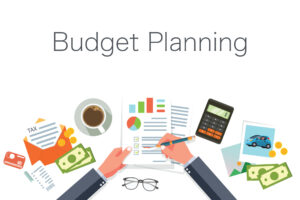
New Year’s resolutions often involve losing weight and gaining control of finances. However, sometimes, the goals can be a little murky. We say we want to be thin or get better with our money, but these vague resolutions can’t be measured. Having a more specific focus helps us track our progress.
I can’t help you with your diet, but I can show you how to create a plan for your finances in the New Year. If you’re like many people, when you say you want to be better with your money, you may mean you want to control your spending. One of the best strategies for achieving this is through a budget; however, you might be afraid to start. You may see budgets as judgmental, controlling what you can spend. However, that’s the wrong way to look at them.
You create your own budget. You’re the one who sets the categories and determines the dollar amounts. If the framework needs an adjustment, you make it. You control the budget, not the other way around. Now that you have the power, something that previously appeared frightening can become a puzzle or a challenge. Let me offer some tips.
First, your budget must be based on your current expenses. Before deciding how much money you should assign to your spending categories, you should understand your bills. To give you a clear picture, I want you to track your purchases for a month. Every. Single. Item. I know you will remember to include your rent or mortgage, but what about that drive-through dinner on your way from soccer practice? If you lose receipts, take a picture of them with your phone as soon as you complete the purchase. Additionally, if you go to superstores, analyze what you bought, and divide your expenses by groceries, household, and discretionary items.
Everyone in the home should track their spending—spouses, partners, kids, parents. If they are part of the home economic system, they need to keep up with their purchases. No criticism or judgment. You all just need to know where the money is going.
At the end of the month, or as you are going along, categorize the items. These classifications will likely be what you use as you create your budget and include headings like
- Retirement Savings
- Emergency Fund Savings
- Rent/Mortgage
- Car Payments
- Insurance
- Utilities
- Groceries
- Eating Out
- Personal Purchases
At the end of the month, study the spending breakdown. Are you surprised where the money is going? If you are like most people, you would tell me that this particular month was extraordinarily high. Maybe you had several birthdays to celebrate and didn’t cook as much as you usually do. In any case, you spent much more than average.
If this happened, then complete the exercise for a second 30 days, even a third. At the end of the analysis, your main questions should be
- Do you have enough income to cover your expenses?
- Are you putting money in savings?
- Are you funding your retirement?
If your answer to all these questions is “yes,” then your budget is easy. Simply assign the correct amount to each column, and you’re finished. However, if the answer is “no,” then it’s decision time.
Where can you make cuts? Remember, this isn’t a financial crash diet. It’s a long-term lifestyle change. You can’t eliminate all shopping and keep your budget. You can’t vow never to eat out again. However, you can avoid expensive stores and bistros, at least most of the time. Although some of your expenses are static, others can be adjusted. And sometimes, what we think is a fixed cost can be tweaked. You could eliminate a video subscription or mow your own lawn. More granularly, thermostats can be raised or lowered, lunches can be packed, and cell phones don’t need unlimited minutes. Remember, you should create a spending plan that works for you. When you get to choose what to adjust, you keep the power. This mindset makes you more likely to follow your plan.
Also, remember to budget for special events. Although the holidays are behind us, many of the bills we incurred last month are just now coming due. Take an honest look at the cost. Did you spend more than you can afford? If so, do you know why? Maybe you ran out of time. Maybe you couldn’t find the perfect gift. Maybe you were spending money to compensate for something else going wrong. Decide if you spent what you could afford, and build that amount into your budget now.
Alternatively, if you can save for holiday expenses in six months, begin in July. Then, you have the first half of the year to save for your summer vacation. Start planning now! The earlier you make reservations, the less you are likely to pay. Of course, read the fine print to be sure you don’t incur penalties if your plans change. Planning your vacation for an extended period of time is also good for your mental health. According to psychologists, we get as much pleasure from anticipating a trip as we do while traveling. Once we return, our memories don’t appear to provide as much satisfaction. If you plan your vacation now, you can look forward to it for months and save money.
Failing to budget seems odd when we compare it to other financial behaviors. You wouldn’t buy a product if you didn’t know what it cost. And yet, often we purchase whatever we want, hoping there will be enough money. We don’t see our income as a maximum price tag. Even if we know we don’t have the cash, sometimes we buy it anyway and put it on a credit card. This is your year to change that behavior. Create and control a budget to keep your finances on track all year. Start while you’re enthusiastic, and you will have a more prosperous 2024!

